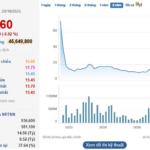
In the conclusion of the Government Inspectorate dated August 5, 2025, out of the five inspected credit institutions—ACB, VIB, OCB, VPBank, and MB—four were found non-compliant with bond issuance documentation requirements. One institution failed to establish a capital plan for the fiscal year regarding corporate bond issuance and issued bonds without adhering to the approved issuance plan by the Board of Directors.
Following the inspection, the banks provided feedback. According to the Inspectorate’s findings, two bond issuances by ACB on December 19, 2018, and December 6, 2019, were intended for medium and long-term lending. However, discrepancies in reporting timelines and the inclusion of short-term loans prompted a review and corrective action as mandated by the Inspectorate. ACB confirmed full compliance and submitted its rectification report on September 24, 2025, as required.
MB, inspected for its private corporate bond issuance, stated its capital use was for “credit and investment needs.” During the audit, some bonds were reviewed before MB initiated investment activities, as the bank prioritized lending—aligning with its disclosed objectives. MB fulfilled all obligations for the mentioned bonds, with most settled and the remaining ~650 billion VND managed per regulations.
At VPBank, seven bond issuances (2016, 2021, 2022) were intended for medium and long-term lending. However, at issuance, VPBank lacked such disbursements and utilized the funds for 12-month loans. Upon maturity, the bank redirected the capital to its originally stated purpose. VPBank confirmed full repayment of principal and interest to bondholders and implemented system segregation for compliance. It also promptly addressed information disclosure requirements post-audit.
OCB emphasized its commitment to transparency and investor obligations throughout its bond issuance and capital usage. For past discrepancies, the bank provided detailed explanations and corrective measures. It has since enhanced internal procedures for corporate bond issuances based on audit feedback.
All banks affirmed adherence to risk management standards and investor protection.
Commenting on the bond market, Mr. Nguyễn Quang Huy, CEO of the Finance and Banking Department, Nguyen Trai University, attributed issues to short-term capital pressures and market oversight gaps. He cited inadequate post-issuance monitoring, shallow disclosure mechanisms, underutilized intermediary roles, and limited investor risk analysis.
Mr. Huy warned that such risks erode market trust, raising capital costs and reducing liquidity. Without trust, the bond market’s strategic role in long-term financing is compromised.
He highlighted weaknesses in post-issuance cash flow management and legal enforcement. Segregated bond accounts remain underutilized, hindering real-time tracking. Intermediaries lack clear mandates, and periodic reporting fails to provide early risk alerts.
Mr. Huy proposed four solutions: dedicated bank accounts for bond proceeds with valid disbursement documentation; independent oversight with suspension authority; digital platforms for real-time monitoring; and periodic audits covering financial and purpose-based usage.
On penalties, he advocated stronger deterrents alongside market trust restoration. For intentional misuse, higher legal accountability should be considered, balanced with clear criteria to avoid discouraging legitimate issuances.
Developing independent credit rating systems was suggested as a long-term “soft” solution, incentivizing self-regulation through market mechanisms.
For sustainability, Mr. Huy recommended five measures: investor education, financial literacy in schools, standardized disclosures, early warning systems, and compliance incentives.
He concluded: “The bond market thrives when trust, knowledge, and discipline align. With transparency as a priority, informed investors, and data-driven regulators, we can achieve a secure, growth-aligned market supporting sustainable economic development.”
– 15:11 22/10/2025
The World of Mobile Reduces Its Chartered Capital
Mobile World Investment Corporation has announced plans to repurchase up to 10 million shares to reduce its charter capital. The repurchase price will range from a minimum of VND 10,000 per share to a maximum of VND 200,000 per share, based on market prices at the time of transaction. Consequently, the estimated maximum expenditure for this initiative is VND 2 trillion.
Novaland Shares in Turmoil as Government Inspectorate Hands Bond Violation Case to Police
At one point during the morning session, the sell orders for NVL stocks at the floor price reached a staggering 7 million units.










































